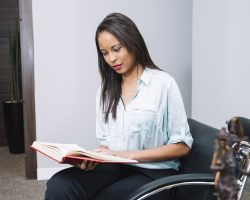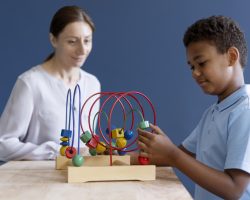School Daze How I Graduated College With Honors

For students with brain-based learning challenges like ADHD and NVLD, excelling in school can be an enormous challenge. I want to share with you some of the tips and tricks I used to graduate with honors to become to get a master’s degree in brain-based education.
Find the Best Instructors for Your Learning Style
An instructor can make or break your success. First, try to determine if the instructor is open to students with learning disabilities and understands their needs for accommodations, such as additional time to take tests. Some professors who “don’t believe” in accommodations will shame students who ask for them in front of their classmates.
It was crucial for me to have professors who were passionate about their subject and skilled in their delivery of course content and materials. I made it my business to talk to other students about the instructors they had in the classes I needed to take. I wanted to know about the instructor’s grading system: do they give pop quizzes? Base tests on class notes or textbooks? Expect frequent participation in class? Assign group projects?
Pace Yourself
Instead of taking five classes a semester, like most of my peers, I took four to reduce stress and to give me the extra time I needed to focus and determine my own pace. I also took one course each summer. When I had courses that were difficult for me, I took them along with less demanding electives to allow me to focus better on the more strenuous classes.
Grade Point Average (GPA) and the Pass/Fail Option
It was important to me to have a high GPA so I chose the pass/fail option for math classes whenever I could. Instead of getting a grade for the class, you pass the course with a grade of D or higher without affecting your GPA. However, if you don’t pass, your GPA will be affected by having a zero added to it.
Dropping Classes
The add/drop process allows you to withdraw after the class starts as long as you meet the cutoff date. This gave me enough time to see how I was doing in class. If I was heading toward failure, I would withdraw. It wouldn’t count toward my GPA and appeared as a W, for withdrawal, on my transcript.
Early-Morning Classes
I had a terrible time getting up, and I hated taking early-morning classes. People with ADHD often have interrupted sleep patterns, and it takes longer for their brains to wake up. NVLDers and NDs have a higher rate of depression, which also makes getting up and out of bed difficult.
To work around this, I enrolled in as few morning classes as possible, but there were classes I needed that were only offered in the early mornings. To get to 8:00 a.m. classes, I set my alarm for 6:00 a.m. and immediately guzzled a bottle of caffeinated iced tea that I had put next to my bed the previous evening. I took my shower the night before and—get ready for this; it’s a doozy— I slept in the clothes I would wear the next day. I know, crazy, right? I wore a clean T-shirt and leggings to bed. In the morning, I’d put on my socks and sneakers and a head- band. Finally, I would grab my book bag and energy bar and head off to class looking like I had just come from the gym!
Note-Taking
I created blank outline forms to use during class lectures. Filling in the blanks helped me to structure and organize topics with supporting details. Otherwise, I’d try to write down everything the instructor said, and I’d wind up with a bunch of notes looking like “chicken scratch.”
Recording Class Lectures
Some instructors allowed me to record class lectures. Find out if there is a schoolwide policy about recording lectures or if it is up to the individual instructors.
There are, of course, dozens more strategies, tactics, software, and apps that can help students, and I will share some more of my own in another post.
This column is an excerpt from Misnamed, Misdiagnosed, Misunderstood, my new book. If you want to learn more about the secrets to my college success, click here. Or check out my blog here.
#nvld #nonverballearningdisorder #nonverballearningdisability #learningdisabilities #aspergers #neurodivergent #autism #adhd #neurodiversity #anxiety #inclusion #adhdawareness #specialneeds #adhdsupport #adhdwomen #adhdmom
Linda Karanzalis, Board-Certified Cognitive Specialist is the author of Misnamed, Misdiagnosed, Misunderstood, a new book on Nonverbal Learning Disorder and other brain-based challenges.
Dr. Ned Hallowell, a psychiatrist, world-renowned expert on ADHD, and the New York Times best-selling author of Driven to Distraction says, “Linda’s book is vivid, compelling, full of heart and fresh understanding. Karanzalis replaces suffering with clarity and triumph for the millions of people with NVLD.”
Linda, who has NVLD and ADHD, has worked for more than 25 years with individuals of all ages with NVLD, ADHD, learning disabilities, and those on the autistic spectrum. As an author, podcaster, presenter, learning specialist, and ambassador for the NVLD Project, she provides validation, awareness, solutions, strategies, and, most importantly, compassion to the millions who live with neurodiversity. Find out more about her story and book at www.lindakaranzalis.com.
Follow Linda Karanzalis through her social media accounts:

Join the NVLD and NeuroDivergent Facebook Support Group
 Linda Karanzalis, MS
Linda Karanzalis, MS
Linda Karanzalis, MS, is a former special education classroom teacher with over 25 years of experience in the areas of learning disabilities, ADHD, social-emotional learning, social skills training, and behavior management














